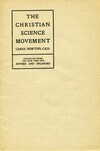

Are you sure?
This bookmark will be removed from all folders and any saved notes will be permanently removed.
Moral Fault and Disease
[From "Literature and Dogma."]
Medical Science has never gauged,—never, perhaps, enough set itself to gauge,—the intimate connection between moral fault and disease. To what extent, or in how many cases what is called illness is due to moral springs having been used amiss, whether by being over-used or by not being used sufficiently, we hardly at all know, and we too little inquire. Certainly it is due to this very much more than we commonly think, and the more it is due to this, the more do moral therapeutics rise in possibility and importance. The bringer of light and happiness, the calmer and pacifier, or invigorator and stimulator, is one of the chiefest of doctors. Such a doctor was Jesus; such an operator, by an efficacious and real, though little observed and little employed, agency, upon what we, in the language of popular superstition, call the unclean spirits, but which are to be designated more literally and more correctly as the uncleared, unpurified spirits, which came raging and maddening before him. This his own language shows, if we know how to read it, "What does it matter whether I say, Thy sins are forgiven thee; or whether I say, Arise and walk." And again, "Thou art made whole, sin no more, lest a worse thing befall thee." His reporters, we must remember, are men who saw thaumaturgy (wonder working) in all that Jesus did, and who saw in all sickness and disaster visitations from God, and they bend his language accordingly. But indications enough remain to show the line of the Master, his perception of the large part of moral cause in many kinds of disease, and his method of addressing to this part his cure.
It would never have done indeed, to have men pronouncing right and left that this and that was a judgment, and how, and for what, and on whom. And so when the disciples, seeing an afflicted person, asked whether this man had done sin or his parents, Jesus checked them and said: "Neither the one nor the other, but that the works of God might be made manifest in him." Not the less clear is his own belief in the moral root of much physical disease, and in moral therapeutics; and it is important to note well the instances of miracles where this belief comes in. For the action of Jesus in these instances, however it may be amplified in the reports, was real; but it is not, therefore, as popular religion fancies, thaumaturgy,—it is not what people are fond of calling the supernatural, but what is better called the non-natural. It is, on the contrary, like the grace of Raphael or the grand style of Phidias, eminently natural; but it is above common, low-pitched nature; it is a line of nature not yet mastered or followed out.
Matthew Arnold.
Enjoy 1 free Sentinel article or audio program each month, including content from 1898 to today.
JSH Collections
This article is included in:
1905 - PAMPHLET
The Christian Science movement
JSH-Online has hundreds of pamphlets, anthologies, and special editions for you to discover.

August 17, 1899 issue
View Issue-
The World's Noblest Book
Henry Rose
-
Moral Fault and Disease
Matthew Arnold
-
From the Religious Press
with contributions from Ed., V. L.
-
The Lectures
with contributions from The Secretary, T. W. Wilson, Carol Norton, W. D. F. Ward
-
A Physician to Physicians
BY ALFRED E. BAKER, M.D., C.S.B.
-
Under Fire at Detroit
A. M. K.
-
Christian Science and Contagious Diseases
Lewis B. Coates
-
The Lord's Song
E. W. S.
-
Positive Statements
M. O. F.
-
Miscellany
with contributions from Charles Frederic Goss, W. T. Vaughan
-
Questions and Answers
with contributions from A Beginner, Same Inquirer
-
Severe Burns Healed
Marion Freling
-
Be of Good Courage
BY J. E. TIPPETT


